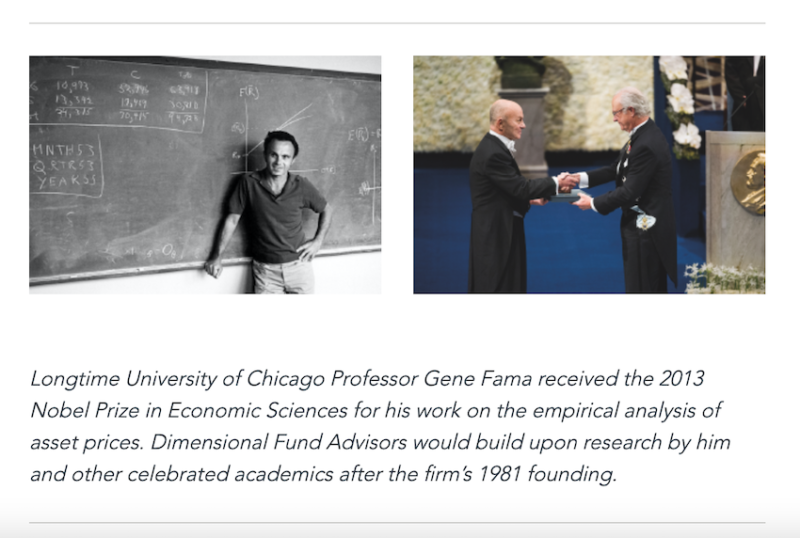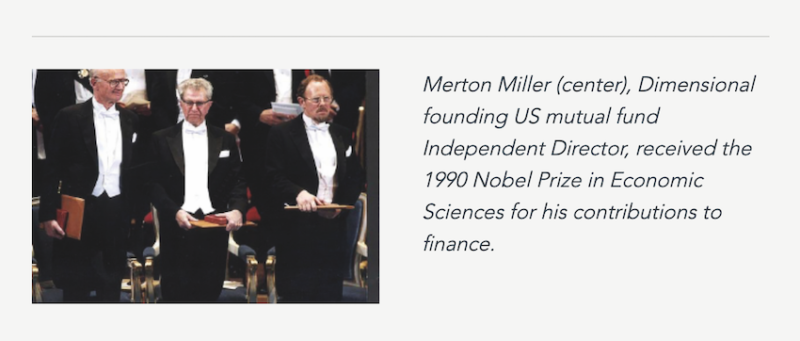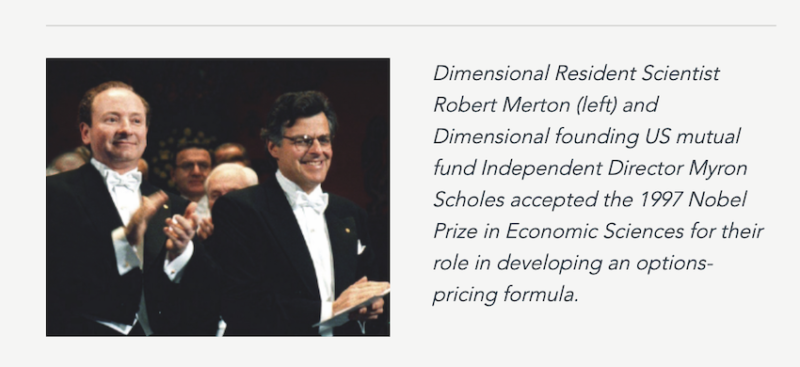
It’s 40 years ago this week that Dimensional Fund Advisors was founded. Here are five timeless investment lessons that one of its founders, DAVID BOOTH, has learned in that time.
Early in my career, I was lucky enough to work on one of the first index funds. It was an incredibly exciting time, because before that the only equity option for investors was to pick stocks. The academic evidence from people like Gene Fama—my graduate school advisor, who would later be recognised as a Nobel laureate — showed there was a better way to approach investing, but no one had put it into practice yet. So we did. Forty years ago, we started Dimensional Fund Advisors because we believed there was a way to invest that was better than stock picking and improved upon index funds.

Today, more than half of the wealth held in mutual funds and ETFs is in index funds, and Dimensional has grown to more than $600 billion in assets under management, largely through word of mouth and the growth of our clients.1 As an industry, we’ve made incredible progress driving down costs, encouraging diversification, and developing innovative solutions that benefit investors. These advances have been profound for investors, and I believe it’s just the beginning.
Yet despite all of the progress, I believe people keep falling into the same old traps. They might chase the latest fads and keep picking stocks. (Just in the past year, we’ve seen frenzies surrounding FAANG stocks, Tesla, and GameStop.) They might try to time markets. Too many people may have sold at the bottom of the financial crisis in 2009 and at the start of the pandemic in 2020. These investors can hurt their chances of long-term success while adding to their anxiety. Investing doesn’t have to be that way.
We need to change the conversation so that people can invest better—and live better. As we celebrate our 40th anniversary as a firm, I’ve reflected on what I’ve learned over the years that I wish every investor could know.
1. Gambling is not investing, and investing is not gambling
Gambling is a short-term bet. If you treat the market like a casino, and you’re picking stocks or timing the market, you need to be right twice — in an aim to buy low and sell high. Fama showed that it’s unlikely for any individual to be able to pick the right stock at the right time — especially more than once.2 Investing, on the other hand, is long term. While all investments have risk, there are things you can do as a long-term investor to manage those risks and be prepared. As my dear friend and Nobel laureate Merton Miller said, “Diversification is your buddy.” Investing, to me, is buying a little bit of almost every company and holding them for a long time. The only bet you’re making is on human ingenuity to find productive solutions to the world’s problems.

2. Embrace uncertainty
Over the past 100 years, the US stock market, as measured by the S&P 500, has returned a little over 10% on average per year but hardly ever close to 10% in any given year. The same is true of dozens of other markets around the world that have delivered strong long-term average returns. Stock market behavior is uncertain, just like most things in our lives. None of us can make uncertainty disappear, but dealing thoughtfully with uncertainty can make a huge difference in our investment returns, and even more importantly, our quality of life.
3. Implementation is the art of financial science
The way to deal with uncertainty is to prepare for it. Without uncertainty, there would be no opportunity. We always emphasize that risk and expected returns are related, which means you can’t have more of one without more of the other. Make the best-informed choices you can, then monitor performance and make portfolio adjustments as necessary. Come up with a plan to get back on track in case things don’t go as expected. And remember, you can’t control markets, so don’t blame yourself for results outside your control — try to relax knowing you’ve made the best-informed choices you can. A trusted financial adviser, a fiduciary who puts your interests first, can help you cultivate this sort of discipline and long-term perspective.
I was compelled to approach investing differently by the research Fama and other leading academics were doing to better understand markets and returns. There’s general agreement on what financial science tells us, yet so much can be gained or lost in application. Just as some sports teams can consistently execute their strategies better than others, investment professionals can consistently add value by dealing better with market mechanics.
Bob Merton, our colleague, and Myron Scholes, an Independent Director of the US mutual funds, were recognised as Nobel laureates for their options-pricing model, which shows that flexibility has value. Great implementation requires paying attention to detail, applying judgment, and being flexible. That’s what we’ve built our firm to do. We start with a fairly simple notion about markets and expected returns, and the real value comes from how we implement those ideas every day. It’s important to us that clients understand we’re advocating for them along every step in the investment process. What do we mean by “advocating?” That when it comes to implementation, the little things add up. We fight for every basis point, never forgetting that we’re investing money our clients have worked lifetimes to save.

4. Tune out the noise
If an investment sounds too good to be true, it probably is. When people ask me if I’m investing in the latest shiny investment idea, I tell them, “If I don’t understand something, I don’t invest in it.” That’s because I’ve seen a lot of fads come and go.
TV pundits handing out stock tips? Friends letting friends in on their next big investment? I see these more as entertainment than information. Stress is induced when people think that they can time markets or find the next winning stock, or that they can hire people who can. There is no compelling evidence that professional stock pickers can consistently beat the markets.3 Even after one outperforms, it’s difficult to determine whether a manager was skilful or lucky.
The good news is you can still do well without having to find what markets might have missed. While markets are unpredictable and may even seem chaotic at times, they have an underlying order. Buyers and sellers come together and trade, which is the activity that sets market prices. Unless each side agrees to a price, they don’t trade. New information and expectations about returns are quickly incorporated. Consistently finding big winners is difficult, but everybody can have access to the expected returns that a diversified, low-cost portfolio can generate.
5. Have a philosophy you can stick with
It can be difficult to stay the investment course during periods of extreme market volatility. At the end of March 2020, the S&P 500 was down nearly 20% for the year.4 Record amounts of money exited from equity mutual funds and went into money market accounts. Those investors who stayed out of the equity market missed out on the subsequent 56% gain in the S&P 500 over the next 12 months. We will all remember 2020 for the rest of our lives. It serves as an example of how important it is to maintain discipline and stick to your plan.
By learning to embrace uncertainty, you can also focus more on controlling what you can control. You can make an impact on how much you earn, how much you spend, how much you save, and how much risk you take. This is where a professional you trust can really help. Discipline applied over a lifetime can have a powerful impact.
These are the ideas upon which we’ve built our firm. Back when we started, we thought there was a better way to invest than what was on offer. We all shared a philosophy about markets and how they work. We believed that the transparency of markets and the way they incorporate all available information in real time could make investing fair to all. We believed we could add value — not just to the bottom line, but by helping change the industry for the good of all investors. We saw a better way, and we got to work.
FOOTNOTES
- 1As of December 31, 2020, Dimensional had $601B in firmwide assets under management, USD (in billions)
- 2Fama, Eugene F., and Kenneth R. French. 2010. “Luck versus Skill in the Cross-Section of Mutual Fund Returns.” Journal of Finance 65(5): 1915–1947.
- 3For details, see Dimensional Fund Advisors’ Mutual Fund Landscape report.
- 4S&P data © 2021 S&P Dow Jones Indices LLC, a division of S&P Global. All rights reserved.
Indices are not available for direct investment. Index returns are not representative of actual portfolios and do not reflect costs and fees associated with an actual investment. Decrease of 19.6% was from January 1, 2020–March 31, 2020. Increase of 56.35% was from March 31, 2020–March 31, 2021.
DISCLOSURES
Past performance is no guarantee of future results. Actual returns may be lower. Investing risks include loss of principal and fluctuating value. There is no guarantee an investment strategy will be successful. Indices are not available for direct investment. Index returns are not representative of actual portfolios and do not reflect costs and fees associated with an actual investment.
Interested in more insights from Dimensional? Here are some other recent articles from this series:
Are YOLO traders undermining efficient markets?
Should a top-heavy stock market worry us?
Why the disconnect between the economy and markets?
© The Evidence-Based Investor MMXXI









